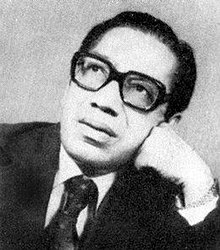Remove ads
Akbar Shah (11 November 1917 – 13 April 1997),[2] known by his pen name as Farigh Bukhari (romanized: Fārigh Buk̲h̲ārī), was a Pakistani multilingual poet and progressive writer.[3] He wrote books, including poetry on various subjects such as literature, social issues and politics in Hindko, Pashto and predominantly in Urdu language. Some of his publications appear about universal values and humanism.
Farigh Bukhari | |
|---|---|
 Syed Mir Akbar Shah a.k.a. Farigh Bukhari | |
| Native name | فارغ بخاری |
| Born | Syed Mir Akbar Shah 11 November 1917 Peshawar, British India, (present-day Pakistan) |
| Died | 13 April 1997 (aged 79) Peshawar, Pakistan |
| Pen name | Farigh Bukhari |
| Occupation | Poet, writer |
| Language | Urdu, Pashto, Hindko |
| Period | Bangladesh Liberation War |
| Subject | Politics, Social, Literature |
| Literary movement | Progressive Writers' Movement[1] |
| Years active | 1934–1997 |
Farigh was born in British India (in modern-day Peshawar, Pakistan).[a][4][1] He along with Raza Hamdani is credited with introducing Urdu literature to Pukhtuns of Attock city, making him the 20th century's first writer of Peshawar translating Urdu into Pashto literature.[b]
Remove ads
He started writing around in 1934, and participated in a mushaira in Calcutta (now Kolkata) where he recited his first-ever ghazal presided over an Urdu poet Raza Ali Wahsat. Besides gazals, a few of his poetic conversations appear emotional and imaginative. He used to criticise wars through his poetry. In 1971, he wrote about East Pakistan (in modern-day Bangladesh), and covered historical events of the war. Later, he opposed military conflicts occurring in East Bengal through one of his poetry collections titled the tragedy of East Bengal.[5][6][7]
Prior to writing about 1971, he wrote an Urdu poetry collection titled Zairo Bam in January 1952, and his house in Peshawar was subsequently raided by the local police who arrested him for his not-known involvement in keeping the formula of an explosive device called "zero bomb". He was also imprisoned, and later displaced for writing about politics involving plural society and social justice. In 1991, he wrote a book titled Tahrik-i Azadi Aur Baca Khan (Freedom movement and Bacha Khan)[c] on a Pashtun activist Abdul Ghaffar Khan covering his independence struggle and political movements carried out during the period of partition. The book was later published by the University of California on 5 March 2007.[4][8]
Remove ads
- Buk̲h̲Ārī, Fārig̲h̲ (1974). سرحد كے لوک گيت.
- Buk̲h̲Ārī, Fārig̲h̲ (1978). Albam.
- Buk̲h̲Ārī, Fārig̲h̲ (1978). خوشبو کا سفر.
- Buk̲h̲Ārī, Fārig̲h̲ (1982). Farigh's poems: Songs of love & struggle.
- Buk̲h̲Ārī, Fārig̲h̲ (1982). Piyāsī hāth.
- Buk̲h̲Ārī, Fārig̲h̲ (1982). Dūsrā albam: Qalmī k̲h̲āke.
- Buk̲h̲Ārī, Fārig̲h̲ (1983). G̲h̲azaliyyah.
- Buḵh̲Ārī, Fārig̲h̲ (1991). Tahrik-i azadi aur baca Khan.
Remove ads
Wikiwand in your browser!
Seamless Wikipedia browsing. On steroids.
Every time you click a link to Wikipedia, Wiktionary or Wikiquote in your browser's search results, it will show the modern Wikiwand interface.
Wikiwand extension is a five stars, simple, with minimum permission required to keep your browsing private, safe and transparent.
Remove ads